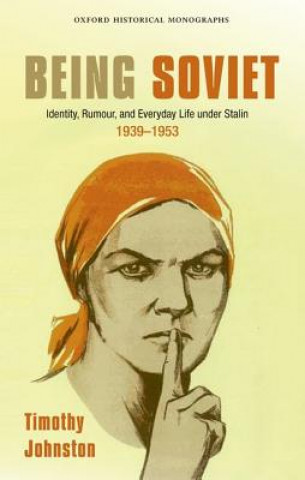
Doručení
Nákupní rádce





Nehodí se? Vůbec nevadí! U nás můžete do 30 dní vrátit
 Dárkový poukaz
V libovolné hodnotě
Dárkový poukaz
V libovolné hodnotě
S dárkovým poukazem nešlápnete vedle. Obdarovaný si za dárkový poukaz může vybrat cokoliv z naší nabídky.
Being Soviet
 Angličtina
Angličtina
 460 b
460 b
30 dní na vrácení zboží
Mohlo by vás také zajímat


Being Soviet adopts a refreshing and innovative approach to the years between the Nazi-Soviet Pact and Stalin's death in the USSR. Timothy Johnston draws on newspapers, films, plays, and popular music in order to examine the changing nature of Soviet identity in this era. He pays particular attention to the evolution of Britain and America from wartime allies to Cold War enemies. Being Soviet then explores how ordinary citizens related to this official version of Soviet identity. It examines that question via the rumours, jazz music, hairstyles, jokes, anti-war campaigns, and sexual relationships of the time. Johnston argues that these 'everyday' activities defined Soviet identity for the man on the street in the USSR. At the heart of the book is a sustained critique of the current emphasis on 'supporters' or 'resistors' of the regime. Johnston suggests that the shadow of Foucault looms too large in the history of Stalinism. The relationship between Soviet citizens and Soviet power was defined by the subtle tactics of everyday living. For many, life was not defined by 'belief' or 'unbelief' but rather the constant struggle to stay fed, informed, and entertained. This more nuanced approach offers a rich and textured image of what it meant to be Soviet in Stalin's least years.
Informace o knize
 Angličtina
Angličtina
Kategorie




 Jak nakupovat
Jak nakupovat


































